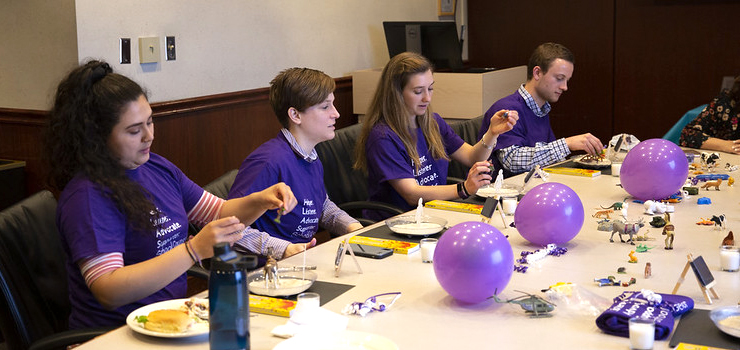
The School Counseling Program of James Madison University is a learning community of faculty, staff, and students who vary in abilities, age, class, gender, ethnicity, race, religion, and sexual orientation. Coming together from a variety of geographic areas, we share a common vision of achieving a vitally important mission – training students to become successful school counselors.
Our alumni are dedicated to providing competent, caring, and ethical services to diverse students in public and private schools. Putting our principles of school counseling into practice, we strive to create an academic community in which our students can thrive personally and grow professionally. While many of our graduates play vital roles in schools along Virginia’s Shenandoah Valley or among the mountains of West Virginia, many more have moved on to serve in rural, suburban, and urban schools throughout the mid-Atlantic region, and across the nation. We invite our students to embark on a life-long journey of exploring new possibilities, refining their skills, and staying fresh throughout their careers. We encourage them to support one another in the formidable task of making a difference in students’ lives by meeting their emotional, social, educational, and career development needs as licensed or certified school counselors. Finally, we challenge our graduates to advance the school counseling profession through service, research, innovation, advocacy, and training.
Through our student-centered approach, we develop compassionate and skilled counselors. Our graduates are well-prepared to serve diverse youth and to become leaders in K-12 school communities.
Objectives
The collective objectives of the Counseling Programs and specific objectives of School Counseling Program are as follows:
Professional Counseling Orientation and Ethical Practice: Recognizes and applies professional ethical standards including clear and appropriate relationships with clients (with attention to provision of services to minors), colleagues, and the community
Social and Cultural Diversity: Collaborates with people of diverse ethnicity, culture, gender, sexual orientation, physical ability, religious beliefs and socioeconomic status in schools and other professional settings.
Human Growth and Development: Develops self-awareness about personal development, applies theories of human development including race, gender, and sexual orientation to work with K-12 students, and develops ethical and culturally relevant strategies for promoting resilience and optimum development across the lifespan
Career Development: Applies theories of career development across the lifespan, implements culturally and developmentally appropriate career assessment and intervention strategies, and plans with K-12 students for college and career readiness
Helping Relationships: Establishes and maintains effective counseling relationships.
Group Counseling and Group Work: Recognizes and positively influences intrapersonal and interpersonal dynamics when leading and co-leading groups. Applies group counseling strategies in developmentally appropriate ways.
Assessment and Testing: Gathers information to assess needs and next steps in the counseling process, including evaluation for serious or foreseeable harm and reporting requirements for abuse or neglect of children and vulnerable adults

